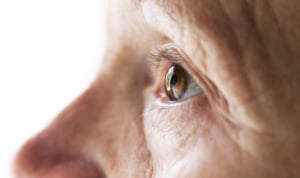Eyelid conditions can affect your eye health, your vision, and your sense of confidence. Entropion and ectropion are two eyelid conditions for which treatment is available. If your eyelids sag away from your eyes or turn inward toward the eyes, you can find the help you need in our Denver office or our clinics in Kansas and the Front Range.

What is Entropion?
Entropion is the eyelid condition that is characterized by inward rotation of the upper or lower eyelid. When the eyelid turns inward, the eyelashes may be felt against the eyeball and can be very painful. The persistent friction of the lashes against the front surface of the eye can cause corneal inflammation and irritation, and sometimes dangerous corneal ulcers.
What Causes Entropion?
Entropion typically occurs when the supporting tendons of the eyelid become lax or from scarring in the inner lining of the eyelid, which can pull the edge of the eyelid inwards towards the surface of the eye. This condition is more common among older individuals due to increased laxity and collagen breakdown over time. Without adequate support, the eyelid can rotate and rub against the eye. Scarring, damage, or injury to the lining on the inside of the eyelids can also cause entropion. Although uncommon, scar-related entropion of the eyelids can be seen with chemical burns of the eye as well as medical conditions such as ocular cicatricial pemphigoid and Stevens-Johnson syndrome.
What Are the Symptoms of Entropion?
Initial entropion symptoms may be mild and intermittent. However, over time, as the eyelid turns further inward, entropion symptoms increase in frequency and severity. Eventually, they may be constant. Indications of entropion include:
- Foreign body sensation, as if something is in the eye
- Excessive tearing
- Redness
- Light sensitivity
- Itching
- Discharge from the eye
- Eye pain
- Blurred vision
What is Ectropion?
Ectropion could be called the opposite of entropion. This eyelid condition is characterized by an outward turn of the eyelid, usually the lower lid. The degree of turning may vary: it can include one segment of the lower eyelid, or instead the entire lower eyelid. When severe, the pink inner lining of the eyelid may even be visible.
What Causes Ectropion Eyelid Condition?
Ectropion may be caused by laxity of the eyelid support tendons and/or muscle weakness in the muscles that secure the eyelid against the eyeball. Muscle weakness may relate to the natural aging process, infection or injury to the muscle of the lower eyelid, or to facial paralysis caused by a medical condition such as Bell’s palsy. In some instances, ectropion is associated with a genetic disorder such as Down’s Syndrome or to a benign or cancerous growth on the eyelid that pulls it away from the surface of the eye. Sometimes, ectropion is caused by trauma, scars of the eyelid or cheek, or from surgery.
What Are the Symptoms of Ectropion?
Ectropion causes tearing symptoms by inhibiting the proper drainage of tears from the eye into the nose. In addition, with ectropion, the eyelid can’t properly protect the eye, which is more exposed to the air and can become irritated. Some ectropion symptoms include:
- Excessive watering or mattering of the eye
- A gritty and sandy feeling, as though something is in the eye
- Light sensitivity
- Burning
- Redness
Will Entropion or Ectropion Eye Conditions Affect My Sight?
Both entropion and ectropion can affect eyesight by causing injury to the cornea, although some patients with mild changes may be asymptomatic at first. Entropion poses a more immediate risk to your vision, as ongoing irritation and inflammation of the cornea and conjunctiva can lead to scarring, infection, and potentially permanent vision loss.
What Happens if Entropion and Ectropion Are Left Untreated?
The eyelids provide vital protection to the ocular surface. When they pull away or turn inward, it disrupts the normal environment in which tear distribution and drainage normally occur. Without treatment, eye irritation may increase to such an extent that the cornea suffers permanent damage. In addition, many patients feel that persistent symptoms such as tearing and the sensation of something in the eye limit their enjoyment of their usual activities. Usually, these symptoms will get worse over time without treatment.
Who is at Risk for Developing Entropion or Ectropion?
There are a few uncommon hereditary problems that can cause these changes in eyelid position in babies and children. However, advancing age is the primary risk factor for entropion and ectropion, and most patients are over 60 years old. Other risk factors include an eye injury or previous eye surgery. Furthermore, people who have had certain eye infections, such as chlamydial trachoma, or who have autoimmune diseases such as pemphigoid have a higher risk for entropion.
Treatment for Entropion and Ectropion Eye Disorders
Entropion and ectropion are both treated definitively with outpatient eyelid surgery. The exact details revolve around correcting the cause of the turned eyelid, the extent of turning and the severity of symptoms. Sometimes, temporary treatment involves medications or contact lenses to keep the eyes properly lubricated and soothed.
Entropion may be temporarily relieved with Botox injections to relax the muscle that pushes the eyelid inward, a special transparent skin tape, or stitches. Stitching the inward-turned eyelid may temporarily hold the eyelid in the proper position for several months. Usually, the eyelid eventually turns back toward the eye.
Surgery to Treat Entropion and Ectropion
For full and lasting correction of either eyelid problem, surgery is usually the best treatment available. The type of surgery that is conducted depends on the cause of the problem and the condition of tissue around the eye. For both conditions, the typical person would have outpatient eyelid surgery that takes 20-60 minutes under local anesthesia with intravenous sedatives. This type of surgery is almost always covered by health insurance and Medicare.
Entropion surgery most commonly involves tightening the muscles and tendons that hold the eyelid against the eye. Grafting to the inner lining may also be necessary if entropion is caused by scarring after an eye injury, disease, or surgical procedure.
Ectropion surgery also most commonly includes tightening of the underlying tendons and muscles. In instances of skin scarring, a skin graft or other tissue graft may need to be performed at the same time.
Am I a Good Candidate for Reconstructive Eyelid Surgery?
Ideal candidates for reconstructive eyelid surgery are those who are overall healthy and nonsmokers with no history of medical conditions that can make it difficult for skin to heal from surgical procedures. People who have realistic expectations of their results will benefit the most from their reconstructive eyelid procedure.
Severe eye conditions such as glaucoma, retinal detachment, and other impairments that may affect your vision may make it difficult to heal from this procedure. If you have cardiovascular disease, diabetes, hypothyroidism, thyroid problems, or dry eyes, this procedure may not be right for you.
If you are unsure about whether or not eyelid reconstruction can benefit you consult with Dr. Alexandra Levitt, or Dr. Robert Fante today.
Can I Have Reconstructive Eyelid Surgery if I Have Had Lasik Eye Surgery?
Yes. Patients who have had Lasik surgery to correct their vision can later undergo reconstructive eyelid surgery. While reconstructive eyelid surgery will not affect the quality of your vision, it is recommended to wait a full six months at the least to allow your eyes to recover from your Lasik procedure before beginning your reconstructive eyelid journey.
Are There Any Risks With Reconstructive Eyelid Surgery?
Just as with any other type of surgery, reconstructive eyelid surgery can come with several risks. These can include bleeding from behind the eye, eyelid flap failure, and in serious cases blindness. With precision and great care, however, the highly experienced doctors at Fante Eye & Face Centre prioritize the safety and overall satisfaction of patients who undergo each treatment. Under their care, supervision, and guidance, these risks can easily be avoided.
What is the Recovery From Reconstructive Eyelid Surgery?
Recovery from eyelid surgery is generally not difficult. People are aware of swelling and bruising (like a “black eye”), some extra mucus discharge causing intermittently blurry vision, and mild transient pain. Patients are usually instructed to apply antibiotic ointment several times a day for the first week. Prescription or over-the-counter pain medication can be taken as directed for pain. The outer corner of the eye is commonly tightened and elevated but returns to a more normal position within the first two weeks after surgery. For the first week it is important to avoid any strenuous activity, and most patients prefer to stay close to home during this time. Sutures are usually removed after the first week, and by the end of the second week of recovery, the majority of swelling and bruising has usually improved to the point that patients can resume most normal activities.
What is the Benefit of Reconstructive Eyelid Surgery?
Many patients are highly satisfied with the results from their reconstructive eyelid procedure. With the elimination of saggy skin, peripheral vision is restored, and oftentimes, patients who undergo this procedure become happier with the appearance of their lids. Not only does this help improve vision, but it can also bring confidence to patients as they become happier with their appearance. At Fante Eye & Face Centre, we understand the importance of feeling comfortable and confident in your skin, and are ready to help!
Read What Our Patients Are Saying!
"Dr. Robert Fante is not only an extremely skilled and competent surgeon, but a compassionate and caring physician. His entire staff, as well, is friendly and efficient. If the waiting time can be a little long on some days, chalk it up to his popularity. His reputation is well deserved."
Click here to read more reviews.
Schedule a Consultation
If you are experiencing symptoms of ectropion or entropion, contact our Denver office today! Call 303-839-1616 to schedule a consultation with our plastic surgeons: Dr. Alexandra Levitt, or Dr. Robert Fante.


